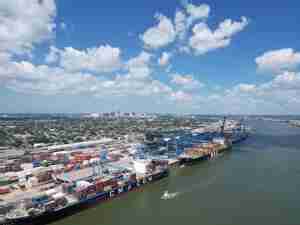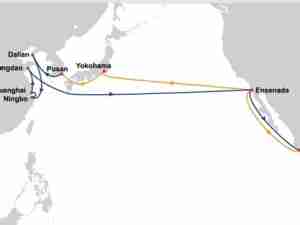- 0.3 tons of Reactive Organic Gases (ROG)
- 28.1 tons of Nitrogen Oxides (NOx)
- 2.4 tons of Particulate Matter (PM2.5 and 10)
- 5,947 tons Carbon Dioxide/Greenhouse Gas Emissions (GHG)
Port of Stockton Transitions its M-580 Marine Highway
posted by AJOT | Aug 11 2014 at 08:44 AM | Intermodal | Ports & Terminals | Liner Shipping
Effective Sept. 1, 2014, the Port of Stockton will be transitioning the M-580 Marine Highway demonstration project from a weekly service to an “as-needed” service. The M-580, which has been in operation as a demonstration project for the last 14 months, is a viable alternative to trucking containers to and from the Central Valley and the Bay Area.
“This project has demonstrated tremendous air quality benefits, reducing air emissions by 80 percent and truck trips by nearly 25,000, making highways safer,” stated Port Director Richard Aschieris. “The M-580 has significantly reduced associated maintenance costs as well. However, challenges remain as the Port of Stockton is the only operating underwriter of this regional project. During this initial period, we learned that the time it takes to build sustainable volumes was longer than anticipated.”
During the past several months, the port met with numerous state and federal agencies to identify possible financial partners to assist in keeping the current level of service viable and thus continue to see the significant emission reductions and associated health benefits. As of today, no state or federal agency has made a financial commitment toward the weekly operation of the project.
Port Commission Chairman Victor Mow commented on the value of the M-580. “What has been established during this successful phase is that this project needs to be a part of the goods movement system in California,” Mow said. “With the congestion we experience on I-580, as well as the air quality and safety benefits of the M-580, we look forward to the day we can bring the weekly service back to benefit our communities.”
The project has created 45 new jobs in the maritime terminal alone, with wages and benefits exceeding $4.5 million. The Port of Stockton will continue to look for future partners in the public and private sectors during the next year and looks forward to continuing its relationship with the U.S. Department of Transportation, the Maritime Administration, California Air Resources Board, San Joaquin Valley Air Pollution Control District and the Bay Area Air Quality Management District.
The Port of Stockton already has invested more than $8 million of its own, non-tax supported, funds in order to support this demonstration project.
To date the service has achieved the following milestones:
116 voyages between the ports of Oakland and Stockton
24,629 truck trips eliminated
7,259 containers transported
Reduced the following pollutants from the San Joaquin and Bay Area air basins:








